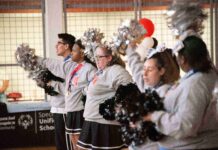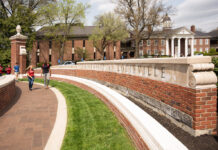
University-wide first-year initiatives fall under his oversight.
UofL Today talked with Billingsley about first-year initiatives at UofL and found out that, while they are important, faculty and staff should be mindful of students’ needs at every level of their academic careers.
How significant is this award?
Among people who work with first-year students, it’s well-known.
The thing that I think needs to be clear is that I got the award for work that a lot of people here have been doing for a lot of time.
What are some of the first-year initiatives at UofL?
There’s the academic orientation course, ‘Gen 101’ in some units, the STOMP modules, Welcome Weekend and other events run all year out of the Office of First-year Initiatives.
As far as I know every undergraduate academic unit has some program or programs that are devoted to first-year student success. Student Affairs, dean of students office, residence halls and our collaborators in University of Louisville Properties all have programs for first-year students, to say nothing of the various mentoring programs.
Orientation is the biggest and oldest freshman outreach program that we have. I know it goes back for at least 32 years because that’s how long I’ve been involved in it.
How does UofL fare on first-year initiatives when compared to similar universities?
In most areas we are in the middle of the pack and in some areas we lead, we do new things. When we did STOMP for the first time a few years ago, it got a lot of play among advisers and first-year people because it was an advance on the things that had been done in the past. A lot has changed in a few years. STOMP is being revised right now. We have Facebook, we have Twitter, we have the whole social networking environment which — it’s hard to remember this, but two years ago that was just a kind of blip.
We have a lot of first-year programs. If you average it out, everybody gets some attention, but if you look at specific cases, we’re missing some people who may be resistant or overlooked.
Parents can help. We do a lot of recruiting for the programs at orientation, both by working on the students and by working on their parents. But some students’ parents don’t attend orientation. Those are the ones that I’m concerned about, because we don’t have the same kind of access to them and we don’t have the assistance of their parents leaning on them: ‘Have you signed up for a REACH Ambassador?’
I think that’s a constant of being the kind of university we are and having the kind of student body we have. Students who live in town don’t have to have their parents drive them 400 miles to come to orientation.
So that problem isn’t unique to UofL?
No. There are social and cultural restraints that limit the success of institutions by type. One of my daughters went to a college with 1,200 students. They bring all the freshmen to campus 10 days early and they have a kind of freshman boot camp where they learn about campus, about studying and other things. They have 300 kids in their incoming class. Every faculty member is involved and gets assigned a student or two — or three — to mentor during their first year. In the case of my daughter, the person who was her freshmen mentor invited her to be the sophomore peer mentor for the freshman class the following year and then eventually was the director of her honors thesis when she graduated. So it wasn’t by accident that they were matched up. Somebody took a lot of time and care to do that.
Next year, we’re likely to have 2,600 new, first-year, first-time, full-time freshmen and we hope a whole lot of transfer students. It would take more than half of the full-time faculty to give students at our big place what my daughter got at her tiny one.
If the faculty/student relationship is important to student success, how does a large university manage it?
The research now says that at schools like ours, and maybe at every school, it’s not the frequency of faculty contact that makes any difference, it’s the intensity.
I loved it when Phil Laemmle (A&S professor emeritus) and company would be out on the quad cooking hotdogs and hamburgers for the students at orientation, but I heard two papers at the FYE (first-year experience) conference reporting that first-year students are not sophisticated enough about the hierarchy of the university to differentiate between faculty and staff or between different professorial ranks. They know their teachers and they know other people who look like they work for the university but are not teachers. The one distinction they can make is between people who wear uniforms and people who do not wear uniforms. So they have that in mind, but otherwise, the chair of the history department, the guy who answers the phones in the advising center — they all just work for the university somehow.
If this is true, we need to work now not on getting faculty to ’socialize’ with students, but to provide professionally and academically significant opportunities for faculty and students to engage each other in productive contacts.
It is a credit to us that many of our faculty will see somebody in their classroom and say, ‘You’re a good student. You need to come and talk to me because we need to think about what you’re going to do next.’ But we haven’t gotten to the point of orchestrating that contact so that every student gets some of that attention.
Matching the particular and distinctive resources of an individual faculty member with students who need those resources is a big project. That matching is the sort of thing I would really like to see us work on next. Once the match is made, it doesn’t take long to test whether it is workable — one good conversation during office hours would do if the faculty member is deliberate and aware. Another of my favorite suggestions is the three-minute office hour: If instructors regularly go to class three minutes before class begins with the intention of speaking to students, pretty soon the students start coming early to take advantage of the time. At first they talk about the weather, the basketball team, something that’s going on on campus. Pretty soon two things happen. One, the faculty member begins to look more like a human being so that, second, if the student has another kind of issue, they’re much more likely to go and talk to somebody who has asked them a question about the weather than they are somebody who has only lectured to them.
Getting to class three minutes early on a regular basis makes a big change in the way students respond overall.
It’s not just first-year students?
No, it’s all kinds of students.
What I hear you saying is, yes, first-year initiatives are important, but it’s important to be engaged with students throughout their academic careers at UofL.
Yes, because students are not finished developing when they finish the first year. Traditional aged students come here when they’re 18. Sophomores are 19 or 20 and they think they know everything. And, no, they don’t. They don’t know everything about the resources that are here. They’re always finding new issues and problems.
We have for years had a large non-traditional student population. Their issues and concerns are a lot different from those of an 18- to 20-year-old. They are more intense. We have resources for them, too, but we can’t get them to them if we don’t know they need them.
Thank goodness we have staff. I can’t count the number of people whose academic careers at UofL have been saved because a staff member said, ‘You need to go talk to so and so,’ ‘Here’s where you need to go for, whatever.’ It’s important for people to understand the significance of those interactions. The effort is small, and the results are very large.
And you never know who will have meaningful impact on a student and his or her academic career. A university in Indiana has sent e-mails to students for several years asking them to name one person who is significant in their staying in college. They’ve had very consistent indications. About 60 percent of the students will name some instructor. Academic advisers also get a lot of credit. People on the residence hall staff — RAs — and sometimes other students, too. And then you get, ‘The guy who sweeps out the lobby every morning always says hello’; ‘The cashier in the cafeteria is always pleasant.’ It doesn’t take much to keep people happy. You don’t have to make massive interventions in their lives. You just have to be pleasant and thoughtful. Those are not difficult things to do.
So is that what you’d say to faculty and staff, that the most important thing is not formal programs, although they have their place, but just to talk.
Yes. Be mindful. Pay attention to what people are saying. Respond not to the question that is asked, but to the question that is meant. We’re lucky that we have a lot of people here who can do that.




























